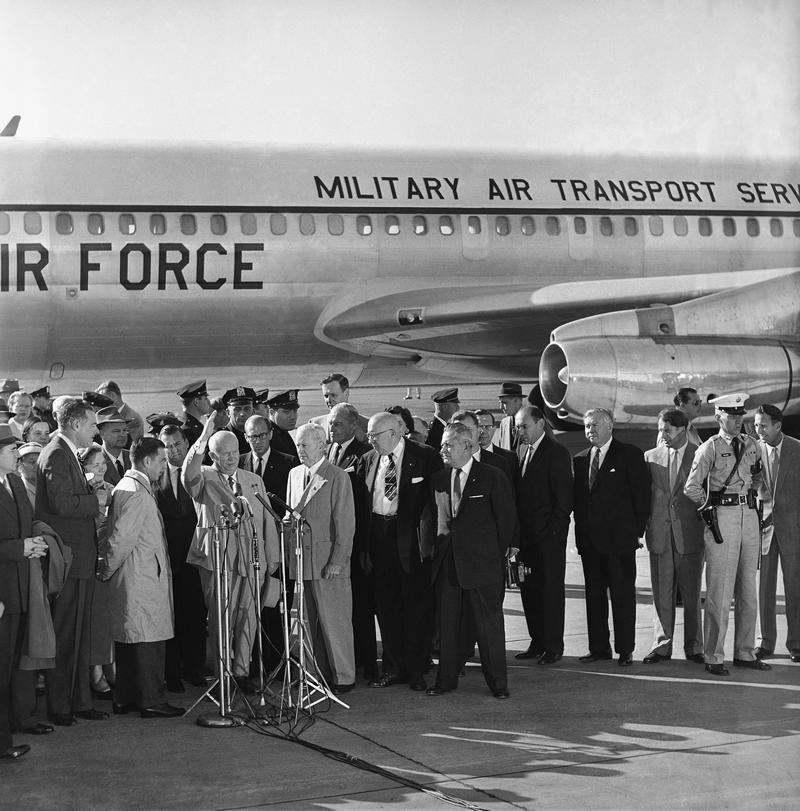Nikita Khrushchev Bids New York Farewell

Nikita Khrushchev bids New York farewell. In this 1959 recording of a brief airport ceremony, the Soviet Premier is addressed by Mayor Wagner's representative, Russell W. Patterson, who gives him a book about the city to peruse while he flies to the West Coast, as well as flowers for Mrs. Khrushchev. Khrushchev, in his remarks, is polite but noticeably more blunt, pronouncing that "The conviction we found was the leaders of this city and especially its people do not want war." He regrets he was not permitted to meet ordinary citizens. Being an old miner, he finds it "pleasing to be surrounded by working men." But he was told that such a meeting could be used for "provocation." He points out that working people provide "the core of the city, creating its wealth." He justifies his meeting with business leaders by pointing out that in a socialist state the Premier represents the "business world" of his country. Robert W. Dowling then thanks Khrushchev for permitting the many recent cultural exchanges including a visit by the Bolshoi Ballet. Khrushchev ignores him, returning to the subject of world tension, insisting that his proposals made to the UN General Assembly mark a real effort on the part of the Soviet Union towards "disarmament and peace." Finally, Henry Cabot Lodge, who will accompany Khrushchev on his trip, thanks the police for their efforts to maintain security.
Khrushchev's visit to the United States was not seen as a success for either side. Each party regarded the other with suspicion. No major initiatives resulted from his two days of talks with Eisenhower. His visit to New York was rushed, its major event being the address to the General Assembly, of which PBS.org reports:
…He ends his speech with a plea for universal disarmament: "Let us compete in who builds more homes, schools and hospitals for the people; produces more grain, milk, meat, clothing and other consumer goods; and not in who has more hydrogen bombs and rockets. This will be welcomed by all the peoples of the world." After Khrushchev’s UN speech, Governor Nelson Rockefeller visits the Soviet premier at the Waldorf-Astoria to welcome him to New York. [In] early evening Khrushchev tours Manhattan with Lodge by car. He would later reflect on his unenthusiastic impressions of the Empire State Building: "If you've seen one skyscraper, you've seen them all."
The trip is probably most remembered for the unlikely diplomatic incident over a proposed visit to Disneyland. It was argued that securing the site in advance would be too difficult. The Soviets were aware of this but, as Foreign Service officer Richard Townsend Davies remembers on The Association for Diplomatic Studies and Training website:
…Khrushchev made great publicity about this, and he was attempting, in what I regard as typical Soviet fashion, to put the Americans on the defensive, and Henry Cabot Lodge – whom I had met and gotten to know a little bit during the few days when he visited Afghanistan and was a very nice man — in this kind of head-to-head confrontation with this very shrewd peasant, this very rough infighter, it took [Lodge] a while to figure out that he was being attacked, but he was, you know. Initially, he thought, well, he really wants to go to Disneyland. And maybe for all I know he did. However, my perception of it was that this had been worked out rather carefully, and it was a ploy. “Let’s say that you want to go to Disneyland. They of course will say, “No, it’s impossible,” and then you have already established your position as a demandeur, whose reasonable request, so far as the American people — the American people will say, why sure, of course, everybody wants to go to Disneyland…It’s a free country.”
However, his much-publicized travels to some extent demystified the Soviet Union's leader who, in contrast to the more sinister Stalin, appeared accessible and down-to-earth. He ate a hot dog, met movie stars, and stayed with an Iowa farmer. Unfortunately, this thaw in the Cold War proved to be temporary. As politico.com recalls:
On returning to Moscow, Khrushchev insisted to his skeptical colleagues in the Politburo that Eisenhower was a reasonable man and that he could continue to deal with him through personal diplomacy. Another summit was set for the near future. Eisenhower also announced he would visit the Soviet Union in 1960. But it was not to be. On May 1, 1960, a Soviet surface-to-air missile shot down an American U-2 spy plane over Sverdlovsk, deep in Soviet territory, and the Soviets captured the pilot, Gary Powers.
Eisenhower initially denied knowledge of espionage flight, thus compounding the problem. The scheduled summit meeting in Paris was scrapped, as was Eisenhower’s planned visit to Moscow.
The following year saw Khrushchev's famous shoe-banging performance at the United Nations, which for most Americans supplanted the more positive images of this visit.
Audio courtesy of the NYC Municipal Archives WNYC Collection.
WNYC archives id: 150249
Municipal archives id: LT8643
